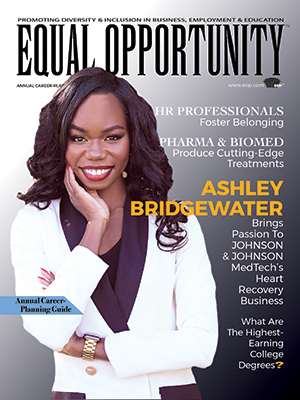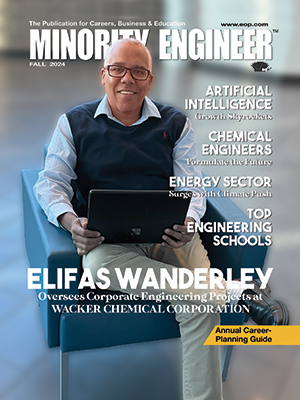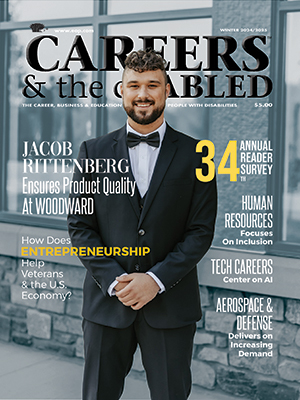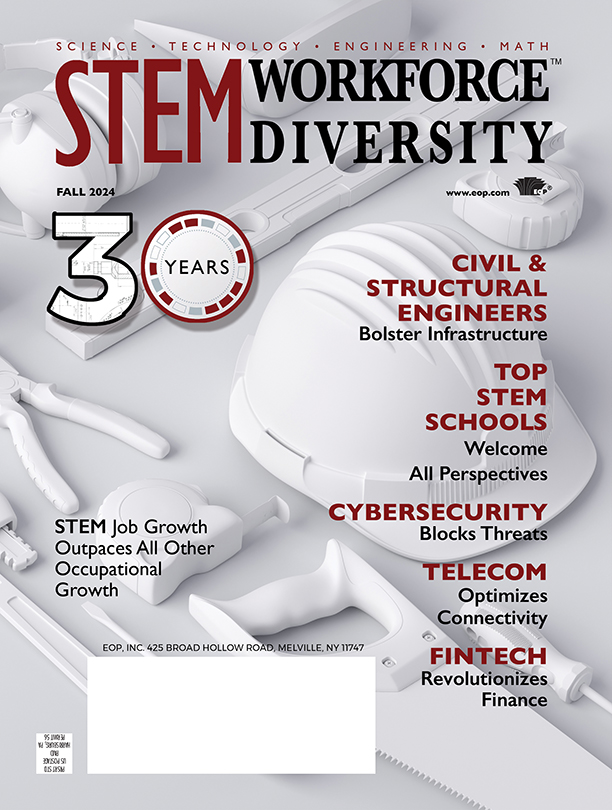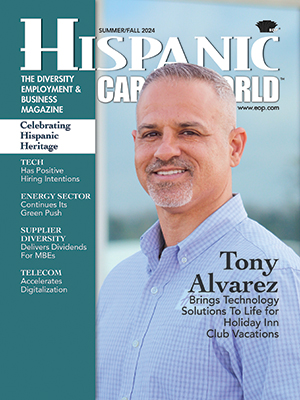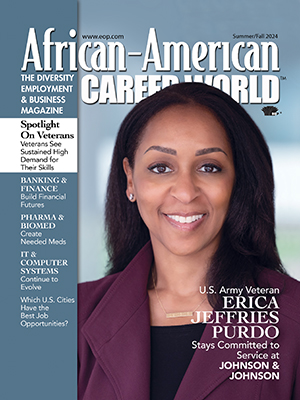By Sandra H. Shichtman
Scientists and engineers find new medicines, improve on old ones, and develop other cutting-edge innovative products, processes, and technologies that help medical professionals do their jobs. Here meet five engineering professionals in biotech/biomed/biopharm who are among those who help doctors and nurses put people first.
Guillen Helps Ensure Genentech’s Medications Are Safe & Effective
Carolina Guillen studied bioengineering in college. But, before earning her bachelor’s degree in 2020, she began her career in 2019 with Genentech, a biotechnology company that develops medicines to combat serious and life-threatening diseases, as a summer intern in a technical operations facility.
“My project was focused on the calibration tolerance/alarm specification gap assessment for a standard operating procedure to verify compliance for its requirements,” she describes.
That internship introduced her to the biopharmaceutical industry and helped her realize that she preferred working on projects that had a direct impact on people. “I was able to make connections with cross-functional groups and conduct informational interviews that allowed me to learn more about each role about which I was curious,” she remembers.
Guillen continued working as a part-time validation engineer contractor until her graduation, after which she became a full-time contractor within the validation group. Then, in 2021, she became a permanent Genentech employee. Currently, she’s validation engineer at a technical operations manufacturing facility in Oregon.
“The facility fills and packages our medicines and serves as Genentech’s West Coast distribution center,” she explains. The team she’s on is responsible for validation activities that include cleaning and process validation.
One of the reasons she was drawn to the company was its mentoring aspect. “During my time at Genentech, I’ve been able to learn from very knowledgeable individuals and mentors to ensure I’m successful in my career here.”
Other reasons are that Genentech encourages and facilitates the professional growth of its employees, its inclusive community, and its support of Guillen’s “passion for diversity.”
Genentech offers two rotational development programs to college graduates who want to start their careers with the company, according to Guillen.
Its operations rotational development program (ORDP) consists of four six-month rotations for students who graduated within two years of applying. It prepares them for the pharma technical operations area of the company and offers them the chance to design and implement new processes, develop project management expertise, support manufacturing, and help significantly drive business productivity and profitability.
Its process development rotational program (PDRP) is a two-year rotational program consisting of four six-month rotations within the pharma technical development area. The goal of PDRP is to develop its associates’ cross-functional technical expertise in biopharmaceutical process development.
Guillen indicates that a technical employee’s manager can be helpful and facilitate the employee’s development in technical areas so as to be able to move into management. Genentech also offers support, such as tuition reimbursement, for additional education needed to acquire new skills.
Within Genentech, Guillen has joined several of its numerous employee resource groups, called Diversity Network associations (DNAs). She participates in its diversity, equity, and inclusion (DEI) mentoring program, Genentech Women Professionals, and Vision, Integrity, Development, Action (VIDA), which is committed to sharing Latinx culture. “These DNA groups have allowed me to network and share ideas with colleagues across different Genentech sites,” she notes.
Guillen is also a member of Team Medley, which fosters an environment that celebrates diversity and encourages a culture of collaboration and acceptance. She became its chair this year.
Outside of the company, she was part of the officer team for the Oregon chapter of the Society of Hispanic Professional Engineers (SHPE), where she could connect with others, share what she’s learned, and give back to her community.
Seek career opportunities with Genentech, whose U.S. headquarters are in South San Francisco, CA, at careers.gene.com. Connect on LinkedIn, X, YouTube, Pinterest, Instagram, Glassdoor and Facebook.
Thomas & Her Team Develop & Improve Processes & Tests at Illumina
Thushara Thomas is a senior process development engineer in the Illumina Lab Services Department (ILS) at Illumina, a biotechnology company that develops, manufactures, and markets tools and systems for analysis of genetic variation and function.
“We’re a high-throughput genomics lab that provides different testing services for our customers,” notes Thomas, who further explains how ILS is different from other departments since it tests for such things as rare and undiagnosed genomics diseases and offers non-invasive prenatal testing.
“My major responsibility is to develop new testing services and improve the existing ones through identifying gaps in our processes and developing new processes and equipment,” she adds.
Thomas has a biomedical engineering degree, which she earned in 2019, and came to Illumina with prior lab experience while an undergraduate. That experience helped her learn best lab practices, scientific problem-solving, and how to plan and execute experiments in an academic setting. A manufacturing process engineering job followed after graduation, a role in which Thomas was exposed to the corporate side of the industry.
“The skills and knowledge I gained during each role planted the seed for the next one and ultimately led me to Illumina,” she shares.
She was drawn to Illumina because of its influence in the genomics space, specifically in the clinical solutions that customers can use for their own research. She researched open positions on Illumina’s career page, interviewed for process engineering roles with two separate teams, and received offers from both. She decided on ILS, which she joined in December 2021.
Her first position was as a process development engineer 2. “I modified and developed new workflows, implemented new equipment, and designed and executed many scientific studies,” she describes.
A year and a half later, Thomas was promoted to a senior level, where, she explains, “I lead more projects independently, mentor other engineers, and work cross-functionally at a higher level.”
As such, during the development phase of a project, Thomas works with other scientists and engineers to plan and run experiments. This can involve programming and testing a robot, extracting and preparing DNA, or setting up a sequencing run.
“During the scoping or implementation part of a project, I’m working with a lot of different groups to make sure our project deliverables are on track and how all of our different teams fit together for the end goal,” she further details.
Thomas is involved with Illumina’s iMentor program, which pairs mentees with mentors based on the goals set by the mentees. It allows her to gain leadership experience and the opportunity to learn additional, transferable skills outside of her day-to-day job.
“In my current role, I have the opportunity to become more technical or move toward the managerial track,” Thomas indicates.
However, she’d like to continue to grow in her current role and explore other technical tracks before moving into management. “I have the support of my manager to take classes, such as the business intelligence and analytics certificate I’m currently pursuing,” shares Thomas, adding that Illumina does offer reimbursement for those classes.
Within Illumina, Thomas has joined the Women in Illumina Network (WIN) – which helped her become involved with iMentor – as well as SHADES and Enabled, two other employee resource groups (ERGs). These ERGs connect her with other employees with similar backgrounds and goals, and provide professional and personal contacts.
Seek career opportunities with Illumina, whose U.S. headquarters are in San Diego, CA, at illumina.com/careers. Connect on X, LinkedIn, Facebook and Instagram.
Palmer Performs Strategic Assessments for BD to Identify Unmet Needs & Business Opportunities
Olivia Palmer, Ph.D. knew she wanted to work in medical technology because it offered opportunities to use engineering to improve people’s health. She chose BD because of its breadth of products spanning the care continuum, including vascular devices, biopsy and diagnostic tools, automated pharmacy solutions, medication infusion, and home health solutions.
She’d earned a bachelor’s degree in physics in 2014 and a doctoral degree in biomedical engineering, focusing on vascular imaging, five years later. She’d also had some internship experience while a Ph.D. candidate. She was accepted into BD’s technology leadership development program (TLDP) in research and development (R&D), a rotational program for both college grads and those with doctorates. TLDP offers three rotations in different business units, each 18- to 24-months long.
Palmer joined BD in 2019 as the project lead for an early innovation project to support patients with end-stage kidney disease. “I worked with an international, cross-functional team on prototype iterations, preclinical testing and procedural development in collaboration with physicians.”
In her next role, Palmer worked as a staff systems engineer on BD’s high-throughput automated PCR device. “This role was hands-on, with troubleshooting and verification and validation testing.”
She’s currently a manager of innovation and strategy for BD’s peripheral intervention business, a role in which her tasks include doing strategic assessments of technologies and determining unmet needs outside current offerings to evaluate emerging trends and determine opportunities for growth.
“I also work with the business development team to evaluate potential acquisition targets, and support our comprehensive business strategy from portfolio and pipeline optimization to commercial excellence,” she further details.
According to Palmer, BD offers many training and mentoring programs to foster career development for its employees.
“I’m very thankful for the managers and mentors I’ve had who challenged me with stretch assignments while supporting and coaching me,” she says of her own career development, adding, “I transitioned from R&D into a strategy role that reports up through the marketing function.”
Palmer is involved with diversity, equity and inclusion (DEI) initiatives at BD. “I’m part of our R&D global inclusion council, which is dedicated to better understanding and meaningfully addressing barriers and challenges with the aim of continuously fostering an environment where all associates can thrive,” she explains.
She also participates in a Women’s Initiative Network (WIN) associate resource group, which partners with BD’s human resources (HR) teams to increase awareness around important benefits, such as mental health resources, back-up child and elder care, and workplace accommodations.
Seek career opportunities with BD, whose U.S. headquarters are in Franklin Lakes, NJ, at jobs.bd.com. Connect on LinkedIn, Facebook, X, YouTube and Instagram.
A Youthful Interest Leads Hostetler-Greco to a Successful Career at Teva Pharmaceuticals
Delanie Hostetler-Greco knew when she started college she wanted to work in the pharmaceutical industry. Teva Pharmaceuticals, which specializes in genetic and innovative drugs, interested her.
Teva has a manufacturing facility in Cincinnati, OH, which was an optimal location for her. This site produces products including liquid-filled hard gelatin capsules, blister packs for different tablets and child-resistant packs.
She spoke to Teva representatives during an engineering career fair at college, where she studied chemical engineering, minored in chemistry and environmental engineering, and graduated in May 2021.
Before she graduated, Hostetler-Greco spent two semesters as a co-op student in Teva’s manufacturing, science and technology (MS&T) department. During her senior year, she was hired to work part time as a MS&T technician II, a role in which she was tasked with generating and executing packaging protocols/reports and testing the raw materials utilized in process validation batches.
“Being able to continue working throughout my schooling allowed me to stay connected to the projects and people on site,” she notes. “Maintaining a presence within the organization helped grow my knowledge of the business and my major as a whole, which qualified me for the chemical process engineer I position once I graduated.”
In that position, which was her second promotion, she was responsible for four technology transfer products and three research and development (R&D) products, two of which were successfully launched and had approval filed for two others by her site. She also contributed to Teva’s electronic batch record team to bring its site into a future state.
Currently Hostetler-Greco is a chemical process engineer II in the MS&T department, where her main roles include generation of batch documentation for both technology transfer and R&D products, support of these batches for sampling on the manufacturing and packaging floor, and presenting the results to various groups.
“I also assist in troubleshooting process upsets as the subject-matter expert in my department for the Glatt-based wet granulation process,” she further details.
She’s received training that included operational excellence training to aid in troubleshooting efficiencies problems in the manufacturing and packaging areas and training from an outside vendor on proper coating techniques. In addition to the training she’s had, Teva provides a technical forum for all MS&T groups in the network to share processing knowledge throughout the company.
Hostetler-Greco currently manages students in the MS&T co-op program, which she hopes will be the starting point in her path to higher levels of management. “If a higher-level degree was required, then Teva offers tuition reimbursement for degrees that would be utilized to further your career,” she adds.
Seek career opportunities with Teva Pharmaceuticals, whose U.S. headquarters are in Parsippany, NJ, at careers.teva. Connect on Facebook, X, LinkedIn and YouTube.
Srivastava Guides R&D Projects Through Various Stages at Grifols
Jyoti Srivastava began her career at Grilfols, which produces plasma medicines and other biopharmaceutical solutions, in May 2003 as a research and development (R&D) intern after earning her bachelor’s degree in chemical engineering and while pursuing post-graduate studies.
She also has a master’s in engineering management and leadership, as well as a diploma in software technology and a global management certificate, both of which she earned while working at Grifols.
Her penchant for data and data analysis was recognized and paved the way to a full-time position at Grifols. “[Since then], I’ve received multiple promotions as I’ve been willing to diversify and expand my role within the company. Grifols offers great internal job transfer opportunities that have also enabled me to spend time in technical support, technical operations, process and risk analysis, and process engineering,” she indicates.
Her prior positions included production specialist, technical support lead and senior process development engineer.
Srivastava is currently a principal process development engineer I in the R&D department, which is a part of the scientific innovation office at Grifols.
“In this role, I serve as the project lead for R&D initiatives at various stages in their life cycle, from development to commercial scale,” she explains. “I lead cross-functional teams to develop, implement, and provide support for licensure and regulatory approvals for Grifols projects that are implemented through R&D.”
The projects are diverse, spanning the entire spectrum of new products from process improvements to technical transfer and life-cycle management.
She wanted a career in the pharmaceutical industry to make a positive impact on people’s lives. “The opportunity to work at Grifols, a company dedicated to life-saving therapies, resonated strongly with me.”
She’d like to advance her career in the pharmaceutical industry by continuously expanding her role, responsibilities and contributions.
Srivastava has participated in and benefited from management-initiated mentoring programs that Grifols offers. The company also offers both technical and soft skills development training that she’s also taken. Grifols’ culture of internal mobility fosters an environment where employees can explore various areas of interest and specialization, shaping their career trajectories accordingly.
Working in R&D links both technical and managerial responsibilities, according to Srivastava. “Our multifaceted projects demand a blend of both skill sets, regardless of specific job titles.”
Srivastava is a member of a Parenteral Drugs Association, where she can learn about emerging trends, current industry and regulatory insights and developments, and best practices.
“I’ve also participated in the American Society of Quality (ASQ), I hold a certified quality engineer accreditation, and I’m a member of the JMP (statistical data analysis software) user group that enhances my capabilities in data-driven decision-making and process optimization,” further notes Srivastava, who’s also published key research in several scientific journals.
Seek career opportunities with Grifols, whose U.S. headquarters are in Los Angeles, CA, at grifols.com/en/careers. Connect on LinkedIn, Instagram and YouTube.
Engineering Better Health Outcomes
Healthcare is constantly looking toward the future as the biotech/biomed/biopharm industry races to produce solutions that support patient needs, dispense hope, and provide life-giving care, as well as mitigate disease and injury.
As a result, biotech/biomed/biopharm innovations are enabling new medicines, medical tools, and products, cutting-edge therapies, and better care delivery methods to help people live fuller, longer lives.
And this industry, according to the U.S. Bureau of Labor Statistics (BLS), remains as strong as ever as it requires more human capital than ever to engineer better health outcomes, to push ever faster growth and to help put people first.
Healthcare innovation is accelerating at an unprecedented scale, particularly in the digital sphere, according to the World Health Organization (WHO). Advances such as artificial intelligence (AI), 3D printing, smart bandages, virtual reality (VR) and clustered regularly interspaced short palindromic repeats (CRISPR) gene editing are transforming the way diseases are detected and treated. And analytics-enabled, individualized attention won’t only treat disease, but also, increasingly, prevent it.
In fact, Frost & Sullivan found that 78% of pharma companies around the globe are expected to use AI in drug discovery by 2025, which will create new roles in AI/machine learning expertise and data analysis. In addition, Grand View Research indicates the global clinical trial market is expected to reach $64.8 billion by 2028, thereby increasing demand for clinical research associates, project managers, and data coordinators.
Captions & Callouts:
Carolina Guillen validation engineer at a technical operations manufacturing facility in Oregon that fills and packages medicines and serves as Genentech’s West Coast distribution center.
“I’ve been able to learn from very knowledgeable individuals and mentors to ensure I’m successful in my career here.”
Thushara Thomas is a senior process development engineer in the Illumina Lab Services Department (ILS) at Illumina.
“The skills and knowledge I gained during each role planted the seed for the next one.”
Olivia Palmer, Ph.D. is a manager of innovation and strategy for BD’s peripheral intervention business.
“I’m very thankful for the managers and mentors I’ve had who challenged me with stretch assignments while supporting and coaching me.”
Delanie Hostetler-Greco is a chemical process engineer II in the MS&T department of Teva Pharmaceuticals.
“Being able to continue working throughout my schooling allowed me to stay connected to the projects and people on site.”
Jyoti Srivastava is a principal process development engineer I in the R&D department, which is a part of the scientific innovation office at Grifols.
“[Working in R&D links both technical and managerial responsibilities]. Our multifaceted projects demand a blend of both skill sets, regardless of specific job titles.”

